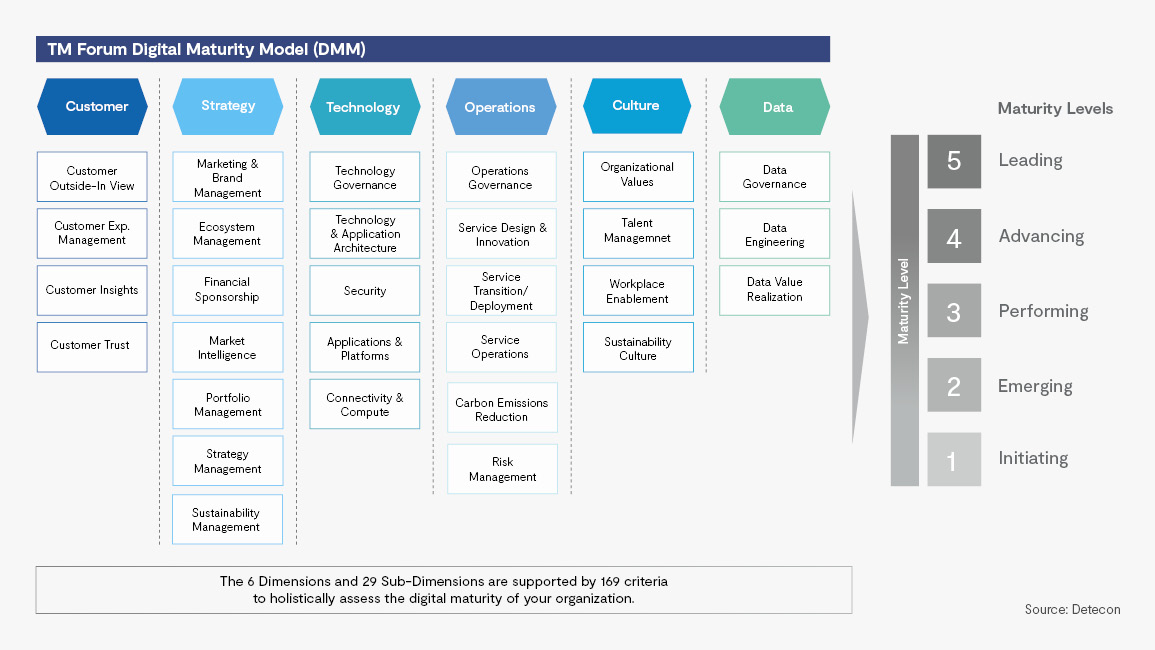In recent years, the number of digital transformation projects in organizations of various industries and sizes has significantly increased. Companies have realized that optimally aligned digital processes bring positive effects such as increased efficiency, cost reduction, and competitive advantages.
Nevertheless, up to 80%1 of all digital transformation projects fail in the initial phase because many organizations lack a clear roadmap for their digitalization and do not know exactly where they stand. Therefore, an approach that captures the current digital maturity in key business dimensions and identifies development potentials is needed.
The Digital Maturity Model (DMM) by Detecon
To help organizations successfully implement their digital transformation projects, Detecon and the TM Forum have developed and successfully used the Digital Maturity Model (DMM) in last years. This model is the first complex industry standard for assessing digital maturity, providing a clear path for further development towards digitalization.
With its structured approach, it offers companies a detailed inventory of their current state of digitalization and a roadmap to initiate and successfully execute targeted digitalization projects. The model helps to set priorities in line with an organization's digital ambitions and to create short- and long-term transformation goals and plans.
Comprehensive Digital Assessment Model
The main advantage of Detecon DMM in comparison to other models in the market is its continuous developed. The model covers six dimensions of digital transformation: Customers, Strategy, Technology, Operations, Organization & Culture, and Data. Which are further detailed and assessed based on five different stages, ranging from Initiation (Level 1) to Leadership (Level 5).
Sustainability in the Focus
The new DMM version 4.1.0 released in June 2024 deepens the six dimensions towards sustainability which can be assessed in different dimensions considering overall sustainability management, CO2 reduction, energy efficiency or sustainability organization culture Moreover, the model allows comparison with competitors, providing additional value for companies.
This holistic approach helps organizations not only to meet regulatory requirements, but also enhance their brand reputation, and achieve long-term sustainable growth.

Evaluation and Adaptation
The assessment process for a company is pretty simple and straight forward. It is carried out through an online assessment tool enabling participants answer from PC, tablet or mobile phone.
After completing the questionnaire by the selected group of stakeholders, Detecon prepares for the client report, providing the assessment results and benchmarking results. This report provides insights into the current state of digital maturity and enables comparison with benchmarks, offering additional value.
One of the specifics of the Detecon DMM is also work with organization sentiment analysis. By selecting right groups of stakeholder a cross-departmental sentiment analysis can be provided to the client to enable transparent view of internal organization dynamics and its support to the digitization.
Practical Application and Success
It is recommended to link organizational transformation initiatives with the DMM and to conduct regular assessments to make the development measurable and quantifiable and to keep the success visible.
The DMM has already helped many organizations to increase their digital maturity and secure their long-term success in the digital world. Detecon's expert analyses provide transparency down to the smallest detail and show how digitalization can be supported within the organization through derived measures.
Conclusion
The Digital Maturity Model by Detecon provides organizations with a comprehensive guide to successfully shaping digital transformation. Through structured assessment and clear goal-setting, companies can increase their digital maturity, exploit efficiency potentials, and secure competitive advantages. Regular application and adaptation of the model ensure that digital transformation is not only initiated but also successfully implemented in the long term.
1Carroll, N., Hassan, N. R., Junglas, I., Hess, T., & Morgan, L. (2023). Transform or be transformed: the importance of research on managing and sustaining digital transformations. European Journal of Information Systems, 32(3), 347-353.








